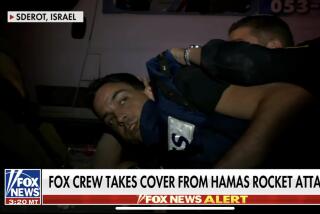TV Scrambles for Any Bit of Scarce News
- Share via
It was dinner time in Los Angeles Saturday when news of the long-expected allied ground campaign in the Gulf War broke into television programming.
ABC, CBS, NBC and CNN reported the offensive about 5:30 p.m., then quickly built a dramatic stage wait by announcing that President Bush would address the nation at 7 p.m.
Despite the lack of immediate footage and audio from the front, it was nonetheless a tense period of waiting, as TV scrambled for whatever facts it could muster and the anchors threw the ball to military analysts and correspondents at the White House and Pentagon.
Since most of the official news was coming from Washington, ABC’s Peter Jennings, in New York, seemed in a better position to guide his network’s reports than were CBS’ Dan Rather and NBC’s Tom Brokaw, both in the Middle East.
Jennings noted to ABC White House correspondent Brit Hume that Bush had been precise every time he had set a deadline and Iraqi President Saddam Hussein had failed to meet it.
“He’s been very quick to move,” said Jennings.
The tension had been building since Hussein ignored Bush’s demand that Hussein start withdrawing from Kuwait Saturday by 9 a.m., Los Angeles time, or face stepped-up action.
At 7 p.m., the President made the new offensive official in a brief statement on all the networks, saying he had decided “to use all forces available, including ground forces,” to eject Iraqi forces from Kuwait--and that the war “has now entered a final phase.”
While the networks kept up continuous reporting, viewers of KNBC Channel 4 may have been startled when the comedy series “Amen” suddenly broke into the all-news coverage at 8 p.m. and was followed by other entertainment programming before the station returned to the war.
KABC Channel 7 was the next to return to entertainment, but KCBS Channel 2 stayed with the war.
At the networks’ headquarters, executives dealt with the problems and strategies of covering the ground war in the face of on-going press restrictions on the media.
Their problems in covering an already tough-to-report war then intensified when, in a TV briefing, Defense Secretary Dick Cheney declined to offer details of the ground offensive, saying he wanted to protect the troops in action. He also said allied spokesmen would be tight-lipped in the days to come.
Ed Turner, executive vice president of news-gathering for CNN, seemed to support Cheney’s caution, saying, “Our immediate problem is to do nothing that inadvertently reveals tactical information that would do damage to the coalition forces.” He said this was “a particular concern of ours because of our global signal,” and that his overriding thought was to be “accurate above all. There are too many people who have sons and daughters and husbands and wives over there.”
For all the networks, the prime problem with Saturday night’s story was a lack of footage and audio reports in the early stages of the ground war.
“We’re uncertain about when we get material from the front,” said Bob Murphy, vice president of news coverage for ABC. “We’ll go back on the air as often as necessary until the ground war stabilizes.”
What did he mean by “stabilizes?”
“I don’t know what that means,” he replied. “It’s the first time we’ve ever had a live war on television.”
Don Browne, executive vice president of news for NBC, said: “Basically, we’ve got a pool situation, but we have no idea of how to communicate with our people. Essentially, we’re in a phase that we expected--very little information, very little news from the front. Most of the information is coming from Washington.”
All the networks expected that to be their situation for the war’s early hours--although CBS did carry a guarded audio report by Bob McKeown from what was described as being somewhere near the front lines. The report offered eyewitness impressions of artillery action.
But later, said Browne, TV news’ focus will shift from Washington “to Dharhan (Saudi Arabia) and Baghdad.”
Joe Peyronnin, vice president and assistant to the president of CBS News, emphasized that “the information flow is limited. The Pentagon is not being open in discussing details of the attacks.
“We have not explained to the American public precisely what is going on,” he said shortly after news of the ground war broke. “And we are mindful that we are a source of information to the Iraqi government. I assume they monitor CBS broadcasts around the world.”
More to Read
The biggest entertainment stories
Get our big stories about Hollywood, film, television, music, arts, culture and more right in your inbox as soon as they publish.
You may occasionally receive promotional content from the Los Angeles Times.










